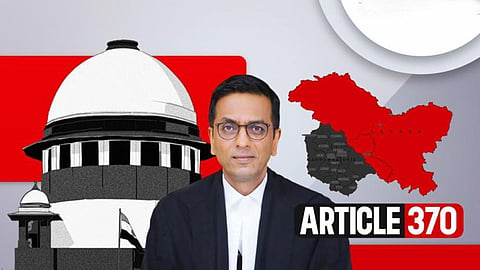

New Delhi | The decision to abrogate provisions of Article 370 that accorded "special status" to the the erstwhile state of Jammu and Kashmir was not made by the political executive alone and Indian Parliament was taken into confidence, the Supreme Court was told on Friday. As the long-winded debate on the issue continued, the five-judge bench headed by Chief Justice DY Chandrachud was also told by senior advocate Rakesh Dwivedi, appearing for intervenor Ashwini Upadhyay, that the word 'recommendation' in Article 370 meant that the assent of the constituent assembly of Jammu and Kashmir was not necessary for abrogation.
"The abrogation of the provision was not an executive decision and that the entirety of Parliament which included Members of Parliament (MPs) of Jammu and Kashmir had been taken into confidence," the senior lawyer said. While framing the Constitution for Jammu and Kashmir, its constituent assembly did not enjoy the same freedom which the constituent assembly of India did, he said, while attempting to draw a distinction between the two constituent assemblies. Referring to Article 370(3), Dwivedi said, "The word 'recommendation' under Article 370(3) means that the assent of the Constituent Assembly was not necessary to abrogate Article 370." "Article 370 (3) says notwithstanding anything in the foregoing provisions of this article, the President may, by public notification, declare that this article shall cease to be operative or shall be operative only with such exceptions and modifications and from such date as he may specify:
Provided that the recommendation of the Constituent Assembly of the State referred to in clause ( 2 ) shall be necessary before the President issues such a notification. The bench, also comprising Justices Sanjay Kishan Kaul, Sanjiv Khanna, BR Gavai and Surya Kant, which was hearing arguments on the 14th day of hearing on a batch of petitions challenging the Centre's August 5, 2019 decision to abrogate the provision, was told by Dwivedi that "the Jammu and Kashmir Constituent Assembly was bound by various things including various dictats of Indian constitution." "It had to ensure justice, liberty, fraternity. It was also bound by Article 1. It could not declare that we're not the federal unit of India. They couldn't say that any part of their territory could not be part of India," he submitted.
Dwivedi, who defended the abrogation, said Article 370 was always considered to be a temporary provision and the speeches of Dr. BR Ambedkar, N.G. Ayyangar (in Constituent Assembly), Jawaharlal Nehru, and Gulzarilal Nanda (in Parliament) clearly indicate that complete assimilation of the State of Jammu and Kashmir at par with other States, in due course, was envisaged from the very beginning.
